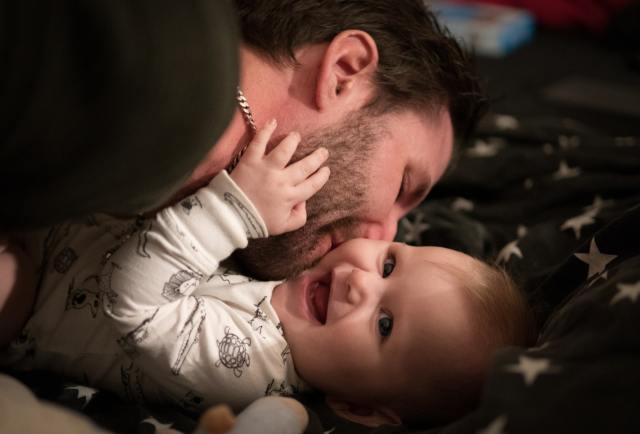
I learned a lot about baby sleep after my first was born. Lucky for us, he was an amazing sleeper! We got into a great sleep routine very quickly and not long after a girlfriend of mine welcomed a sweet new baby into the world too! Except her baby wasn’t sleeping. She asked me what she could do to help her baby self soothe?
I thought long and hard about all the different tactics we tried. All the ways we had prepared his sleep environment to help him sleep through the night. That’s when I realized, there were three solid steps we took to help your baby self-soothe for better sleep, here’s what they are:
1. We always put our baby to bed drowsy, but awake. This can be confusing, but it’s a crucial step toward allowing your baby the chance to fall asleep independently without any sleep associations tied in. What I mean by sleep association is, for example, let’s say you put your baby to sleep with their pacifier. Eventually, the pacifier falls out. Many babies then wake once their comfort item is taken away from them. Since they need that comfort item to go to sleep, they will struggle to put themselves back to sleep and cry until it’s returned to them. The pacifier is only one example of a sleep association.
Other common examples include:
-
Rocking baby to sleep
-
Feeding baby to sleep
-
Falling asleep in a baby carrier
It might be challenging at first and don’t worry if your baby doesn’t get the hang of it right away, but give your baby 2-3 minutes to try and put themselves to sleep.
This can be done by feeding the baby their bottle or nursing the baby while they’re awake. Proceed to burp your baby and gently rock until they are calm and look sleepy. Once your baby is calm and quiet, place them down in their sleep spot on their back.
Quietly walk out of the room and give them time to try and fall asleep.
If your baby doesn’t succeed right away, that’s ok. Simply repeat the process until they do.
Plus, we can all agree that us sleep-deprived moms need sleep. Feeding baby to sleep or letting them sleep in their carrier while running errands won’t make or break your progress from time to time either.
2. Set up a safe sleeping environment for your baby. The other big thing we did was we made sure our son’s sleep space was 100% safe and calm. This looked like keeping the room completely dark, using a white noise machine to mimic what life was like in the womb, placing him down on his back while sleeping, keeping him in a baby sleep sack, and making sure there were no loose toys or items surrounding him in his crib or sleeping space.
Let’s break these down a little more to understand their benefits.
-
Keeping the room completely dark: The biggest reason for darkening a baby’s room is to help them learn the difference between day and nighttime sleep. As newborns, babies aren’t able to consolidate their sleep routine until they reach that 4-5 month mark. That’s why it’s important when they’re younger to build that healthy foundation to help them start to learn the difference between daylight (getting outside when the sun is out) vs. nighttime (keeping the rooms dark to promote sleep).
-
Using a white noise machine: Using a white noise machine (or turning a bedroom fan on) is nice because it can help drown out outside noises that may startle your baby awake and it can help mimic those slushing and swashing sounds they heard in utero.
-
Placing your baby down on back: You’ve seen the term “back is best”. Prior to learning how to roll, if you place baby on their stomachs and they end up getting short of breath or shoving their face into their mattress, they have a significantly higher risk of suffocating because they aren’t strong enough to move themselves out of that position.
-
Using a sleep sack or swaddle: Using a swaddle or sleep sack can simply help your baby feel warm and secure. Imagine that snug little amniotic sac they’ve been living in for so long and now it’s just gone. It may be a trick to find the right one for your baby, but when you do, it’ll be glorious!
-
Removing toys and loose objects in their sleep area: Because young babies aren’t strong enough to move themself out of harm’s way, it’s always best to eliminate any risk of choking or suffocation.
3. Pay attention to baby’s sleepy cues and start a sleep routine. One of the hardest things to do in the early days is to know exactly when your baby needs to sleep. It seems like one minute they’re sleeping and the next they’re ready to eat. As your baby gets older, you can start to pick up on their sleep cues which will help you get them down to sleep before they become overstimulated and unable to self soothe at all.
For my son, he would always start rubbing his eyes and looking around the room. That was his first sleepy cue I began to notice.
When I’d miss his cues, he’d start to become fussy, agitated, would bring his hands to his face, and ONLY want to nurse—he would refuse a bottle each time he got too overstimulated.
Other baby sleep cues might also look like:
-
Yawning
-
Rubbing face
-
Rubbing their eyes
-
Crying
-
Grunting/Whining
-
Pulling ears, hair, or face
Now that you know my three steps to help baby self soothe themselves to sleep, I hope you can be well on your way to a much needed night’s rest!























